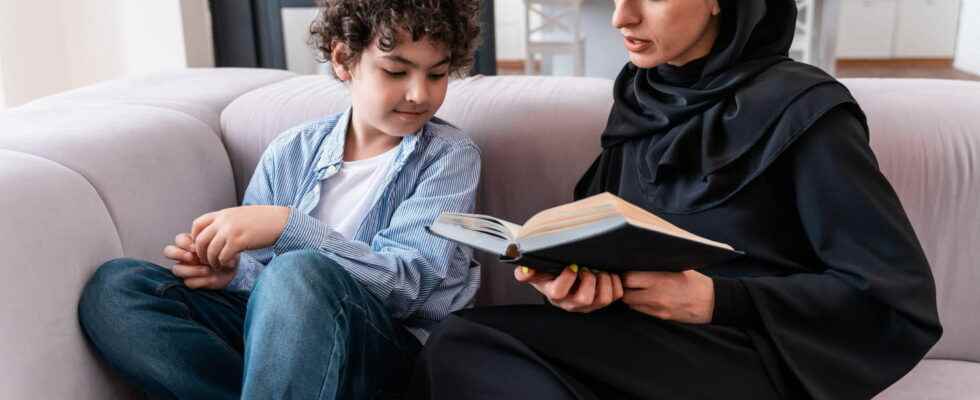The month of Ramadan should begin on March 22 until April 21, 2023. Dates which are to be confirmed by the religious authorities during the Night of Doubt. We take stock of the holy month of Muslims.
In March, practicing Muslims will begin to prepare for the Ramadan. In the Muslim religion, Ramadan is a major event which corresponds to the blessed month during which the Koran was revealed. For several weeks, a strict fast is observed every day, from morning to evening. What are the dates, times of the beginning and end of the fast ? Which prayers to follow during Ramadan? History, traditions, prohibitions… Here is the information to prepare well for the Ramadan 2023.
What is the date of Ramadan in 2023?
In France, Ramadan should start around Wednesday March 22 and end one month later on Friday April 21, 2023. However, these dates must be confirmed during the “Night of Doubt”, which falls during the month of Chaabane and is held shortly before the start of the fast. As every year, it is the Muslim religious authorities who communicate the official dates of Ramadan.
When is the start of Ramadan 2023?
The start of Ramadan begins at dawn, when the first light of day appears, after the Fajr prayer. Muslims call it the “Imsak” moment, which corresponds to the preparation for fasting. This year, the beginning of Ramadan is estimated on Wednesday morning of March 22.
When is the end of Ramadan 2023?
The end of Ramadan occurs during Eid al-Fitrwhich marks the breaking of the fast in the month of Ramadan. In 2023, it should fall on Friday, April 21.
The date of Ramadan is calculated during the “Night of Doubt” thanks to the observation of the first crescent moon, visible after the new moon. A theological commission meets expressly to observe it, and based on astronomical observations, the dates for the start and end of Ramadan are calculated.
What is the origin of Ramadan?
To find the origin of Ramadan, we must go back to the year 610. The angel Gabriel would have appeared to the prophet Muhammad in order to reveal the Koran to him. This revelation – Laylat al-Qadr or Night of Destiny – would have occurred during Ramadan. It is to commemorate this event that Muslims practice fasting for a month. Formed by the Arabic root “ar-ramad”, Ramadan means “scorching heat”.
What are the prohibitions during Ramadan?
During Ramadan, Muslims must respect several prohibitions. In addition to daytime fasting, practitioners should observe very strict behavioral rules. During this ascetic period, it is forbidden to have sex during the day, to smoke, to make obscene remarks or to wear make-up, from sunrise to sunset. It is important to note that inadvertent eating does not imply atonement or catch-up fasting. The stunned thus benefits from a certain indulgence. Conversely, a deliberate transgression of the rules advocated by Ramadan invalidates the fast.
What are the prayers to observe during Ramadan?
Muslims practicing Ramadan must pray five times a day. These five prayers punctuate the days of Ramadan. Among them we find:
- Fajr Prayer
- The Dohr Prayer
- The Asser Prayer
- The Maghreb Prayer
- The Ichaa Prayer
What are the prayer times during Ramadan?
The prayer times being determined by the movement of the sun, Muslims should refer to a calendar of prayer times during Ramadan. Generally, the five prayers take place at key times during the day.
- Fajr: the dawn prayer. In February, for example, the hours vary from 6:33 a.m. to 5:55 a.m. depending on the date.
- Dohr, the early afternoon prayer (approximately 1:05 p.m. in February)
- Asser, the late afternoon prayer (between 3:24 p.m. and 3:57 p.m. in February)
- Maghreb, prayer at sunset (between 5:51 p.m. and 6:34 p.m.)
- Ichaa, the prayer to be said before midnight (between 7:25 p.m. and 8:02 p.m.)
What to eat during Ramadan?
Dates, Chorba, Harira, semolina, wheat, oriental pastries... Each evening when the sun goes down, the fast can be broken. It’s’iftar, or the evening meal. Until dawn – hour of theimsak – Muslims are allowed to eat and drink.
What time to eat during Ramadan?
During Ramadan, the time to eat varies according to sunset and sunrise. In France, from one city to another, the time changes by one to two minutes every day. Muslims must break the fast and eat as soon as the sun goes down. Another meal is then taken just before dawn.
Who can follow Ramadan and what precautions to take?
All pubescent people are targeted by the fast. Some Muslims may however be exempted from this practice in strictly defined cases: in case of chronic illness, pregnancy, travel or old age.
What is Eid al Fitr?
Eid al-Fitr still called “Little party”, as opposed to the Big party of the‘Aïd el-Kébir (or Aïd-Al Adha, day of the sacrifice), gives rise to various festivities. After a prayer at the mosque, Muslims, on the occasion of a hearty lunch, can offer themselves gifts or different dishes, traditionally pastries. This is also the time to fulfill the religious obligation of Zakat, namely charity.
What is Zakat El Fitr Almsgiving?
It is also a tradition that practitioners adorn themselves with new clothes and give alms for breaking the fast dedicated to the poor and called Zakat El Fitr. This custom thus makes it possible to validate the fasting month of Ramadan. It is generally the father of the family who pays a sum of one amount of 7 euros to each member of the family for whom he is responsible. It is the Muslim Theological Council of France which sets the amount of the Zakat El Fitr alms.
To wish a happy Ramadan to loved ones, it is customary to pronounce “Ramadan Mubarak” ! You can also say “Ramadan Kareem” at the very beginning of the month of Ramadan, which means “generous Ramadan, beneficent Ramadan”.
